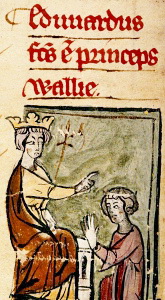The 1299 Treaty of Montreuil (Latin: Tractatus apud Musterolium) or Montreuil-sur-Mer[a] (French: Traité de Montreuil-sur-Mer) was part of the negotiations between King Edward I of England and Philip IV of France during the 1294–1303 Gascon War. It provided for the betrothal of Edward's son Prince Edward of Caernarfon and Philip's daughter Isabella ("the She-Wolf of France"). It was drafted at Montreuil on 19 June 1299[1] and ratified by Edward I on 4 July[2] and Philip IV on the Feast of the Invention of St Stephen (3 August).[3]



The treaty was negotiated on Edward I's behalf by Henry de Lacy, the earl of Lincoln; Guy de Beauchamp, the earl of Warwick; and Amadeus V, count of Savoy. Under its terms, should Edward I default on the treaties,[clarification needed] he would forfeit Gascony; if Philip defaulted, he would pay a fine of £100,000.[4] It was said by contemporaries that the alliance brought "great unhappiness to both parties".[5] Edward I also privately instructed the count to enquire about Philip's half-sister Margaret of France, whom Edward married at Canterbury soon afterwards on 10 September.
Upon France's ratification of the original treaty, it was supplemented by the Treaty of Chartres on the same day.[6] The final betrothal of Prince Edward, by then Prince of Wales, and Isabella formed part of the 1303 Treaty of Paris that finally concluded the war. Following the prince's accession as Edward II in 1307, the two married at Boulogne-sur-Mer on 25 January 1308, when Isabella was 12.
Notes
edit- ^ This historic name of Montreuil should not cause it to be confused with Montreuil in Pas-de-Calais, which has been formally known as Montreuil-sur-Mer since 2023.
References
editCitations
edit- ^ Rymer & al. (1745), "Tractatus per Regum Angliae & Franciae Nuncios apud Musterolium coram Episcopo Vicentino Nuncio Papae super Pace inter Ipsos Reges Reformanda" [Treaty between the Envoys of the Kings of England and France at Montreuil before the Bishop of Vicenza Envoy of the Pope Concerning the Resumption of Peace between the Kings].
- ^ Rymer & al. (1745), "Ratificatio Tractatus Pacis Habiti apud Musterolium coram Episcopo Vicentino Papae Nuncio" [Ratification of the Treaty of Peace Held at Montreuil before the Bishop of Vicenza Envoy of the Pope].
- ^ Rymer & al. (1745), "Tractatus apud Musterolium coram Nuncio Papae Habiti Ratificatio per Regem Franciae" [Ratification by the King of France of the Treaty Held at Montreuil before the Envoy of the Pope].
- ^ Weir (2005).
- ^ Saaler (1997).
- ^ Rymer & al. (1745), "Compositio per Nuncios Angliae & Franciae apud Mustroill de Pace Facienda inter Ipsos Reges Secundum Formam Pronunciationis Domini Papae coram Episcopo Vicentino sub Sigillo Ejusdem Episcopi" [Statement by the Envoys of England & France at Montreuil on the Peace to Be Made between the Kings According to the Form of the Lord Pope's Pronouncement before the Bishop of Vicenza under That Bishop's Seal].
Bibliography
edit- Rymer, Thomas; et al., eds. (1745), Foedera, Conventiones, Literae, et Cujuscunque Generis Acta Publica inter Reges Angliae et Alios Quosvis Imperatores, Reges, Pontifices, Principes, vel Communitates... [Treaties, Conventions, Letters, and Public Proceedings of Any Kind between the Kings of England and Any Other Emperors, Kings, Popes, Princes, or Communities...] (in Latin and French), vol. I, Pt. 1 & 2 (3rd ed.), The Hague: Jean Neaulme, pp. 208–210.
- Saaler, Mary (1997), Edward II 1307–1327.
- Weir, Alison (2005), Queen Isabella.